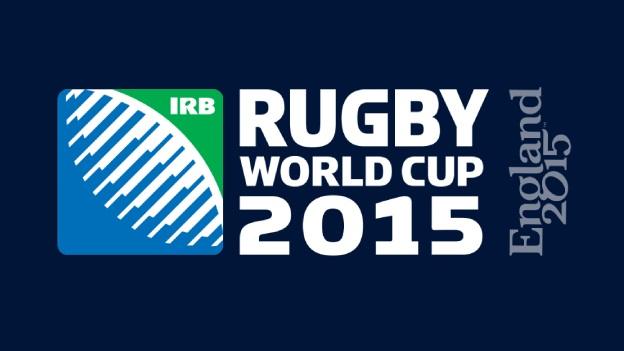Rugby World Cup 2015: Southern hemisphere turn on style
- Published
- comments
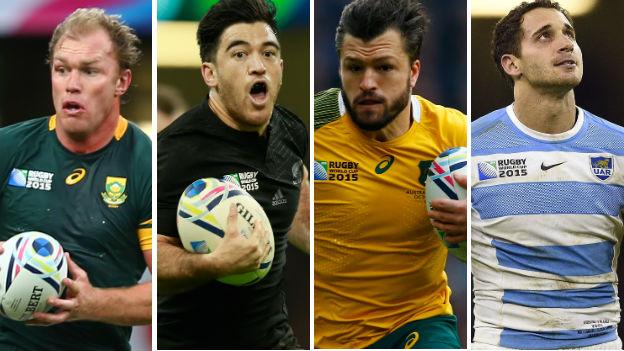
South Africa, New Zealand, Australia and Argentina will contest the first all-southern hemisphere World Cup semi-finals
Rugby World Cup, 18 September-31 October |
|---|
Coverage: Live on BBC Radio 5 live or 5 live sports extra, plus live text commentary on the BBC Sport website. |
Further coverage: BBC Radio Wales, BBC Radio Cymru, BBC Radio Scotland and BBC Radio Ulster. |
There have been a lot of firsts at this World Cup. Not all of them have been good from the perspective of an England fan.
After Stuart Lancaster's side became the first sole host nation to fail to make it out of the pool stages, this weekend saw South Africa, New Zealand, Argentina and Australia win through to set up the first set of semi-finals without a northern hemisphere team.
As a proud Englishman, I would love nothing more than for England to be in action at Twickenham this weekend.
Or, if that was not possible, for there to be a northern hemisphere team there.
But it is impossible not to be excited by the prospect of this weekend's two matches. And to marvel at the style with which the teams involved advanced from the last eight.
Pumas pounce in the wide-open spaces
Ireland are used to establishing a platform through a strong, well-functioning scrum and line-out.
But they were never given a chance on Sunday as Argentina roared into a 17-0 lead after just 13 minutes and then found a devastating sprint finish with tries from Juan Imhoff and Joaquin Tuculet carrying them to a 43-20 win.
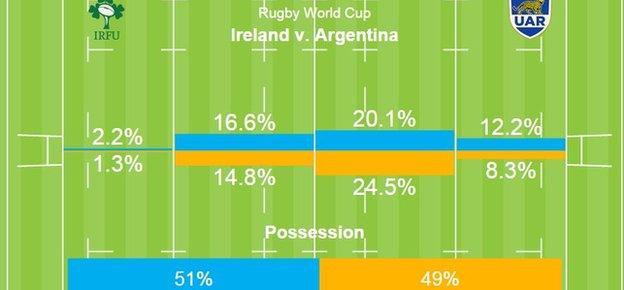
Argentina had less ball and field position, but still romped to a 23-point victory over Ireland
Ireland could not get a foothold in the game because of the tempo the Pumas set and the areas they focused on attacking.
Their forwards produced quick ball - preventing Ireland getting organised - and then the backs attacked the two 15m channels out wide where Ireland's narrow defence was weakest.
They also had Ireland on the back foot in the scrums where the front row of Marcos Ayerza, Agustin Creevy and Ramiro Herrera at times obliterated their opposite numbers.
When I played Argentina, they were amateurs in the truest sense of the word.
Most of their players still played back in Argentina and they stuck to their traditional strengths of scrummaging and set-piece.
This side is different. A lot of them have experience playing at Europe's top clubs.
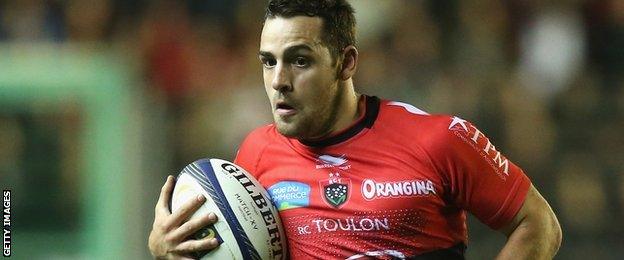
Argentina fly-half Nicolas Sanchez, currently at Toulon, will play for Argentina's new Super Rugby franchise from January
Fly-half Nicolas Sanchez has been at Toulon for example, learning his 10 trade from the likes of Jonny Wilkinson and Frederic Michalak. Wing Imhoff is at Racing, while prop Ayerza will have picked up plenty while working at Leicester.
And as a collective, they have got fitter, more cohesive and more streetwise since they were admitted to the Rugby Championship in 2012.
They are having the time of their lives in this tournament and they are backing themselves. It looks like such a positive mentality - there is no fear of losing - and that is a powerful thing.
All Blacks are a privilege to watch
One of the things that I was most looking forward to before this tournament was watching this All Blacks side.
To be around in the same era as them and get a chance to watch them is a real privilege.
Registered players in Tier One nations | |
|---|---|
South Africa | 342,316 |
England | 340,347 |
France | 291,202 |
Australia | 230,663 |
New Zealand | 148,483 |
Ireland | 96,880 |
Italy | 82,143 |
Wales | 73,444 |
Argentina | 56,998 |
Scotland | 49,305 |
Semi-finalists in bold, figures from 2014 World Rugby review | |
Over the last four years, they have won 47 matches, drawn two and lost three. They are absolutely phenomenal.
The key to their success is easy to understand, but harder to replicate.
The beauty of New Zealand is that they do the simple things brilliantly.
Each of their players - from one to 15 - has a great skillset to base the position-specific specialism on. Each of them is comfortable with the ball in hand, can give a pass and understands how and where to attack their opponents.
For some teams those basics can slip when they are under pressure, but All Blacks don't seem to.
It means that when they are under pressure, they don't fall back on fancy moves.
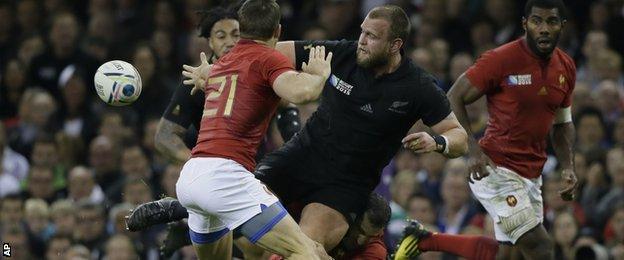
Replacement prop Joe Moody set up team-mate Tawera Kerr-Barlow's second try against France with a skillful offload
With quick ball, a rugby brain and the ability to see where the mismatches are, they exploit whatever weakness their opponents have.
That comes from the coaching they get as youngsters.
In lots of parts of the country, the kids are divided into teams based on weight rather than age., external Kids develop at different rates and if they are physically a lot bigger than other players their age, they are moved into matches where they cannot just run over people.
Instead they have to think about what they are doing on the field and outwit the opposition, beating them with skills. Just as they have to at the very top level.
In England there seems to be more focus on size, weight, height and strength than skills. The New Zealand approach works better. It must.
There are fewer than 150,000 registered rugby players in New Zealand., external In England, there are 340,000 backed by the richest union in the world. Yet we are not producing enough players who match up to their southern hemisphere counterparts.
Wallabies better than scoreline suggests
In the end, Australia beat Scotland by a point, secured through a penalty that never should have been.
But when the dust settles and you look at the stats, it is clear that the Wallabies were the dominant side in the match.
They scored five tries to three, had 55% of possession and 62% of territory. But rugby has a habit of throwing up matches where the scoreboard defies the flow of play. Scotland's three tries were all attributable to Australian errors.
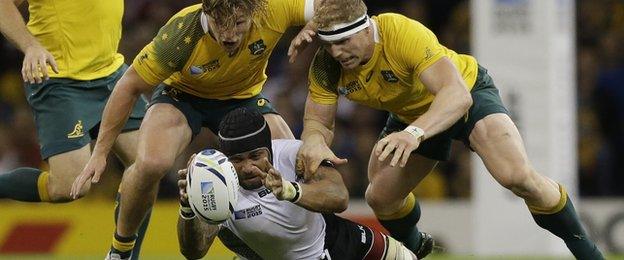
David Pocock (right) leads the tournament in turnovers, having stolen possession 10 times
Second row Rob Simmons lost concentration on the fringe of a ruck to allow Peter Horne to stroll over, then Bernard Foley's kick was charged down to set up Tommy Seymour's score before Mark Bennett snatched an interception for the third.
That combined with Foley's wayward first-half kicking kept Scotland in it.
Some sections of the Australian media, external have said the narrow win shows that they cannot win the World Cup without flanker David Pocock, who missed the weekend through injury.
World Cup semi-finals | ||
|---|---|---|
Saturday, 24 October, 16:00 BST | South Africa v New Zealand | Twickenham |
Sunday, 25 October, 16:00 GMT | Argentina v Australia | Twickenham |
One player does not make a team, but he is a presence who galvanises them. They will be used to the sight of him at the breakdown with his behind in the air and his arms wrapped around the ball.
When they see that they will know that they are either winning a turnover or considerably slowing up the opposition. He is reportedly ready to make his comeback, external against Argentina this weekend and could be key to that game.
South Africa rediscover their mojo
The Springboks are perhaps a bit different from the other three semi-finalists.
Their gameplan relies on overwhelming the opposition with physicality. It works on the brute logic that a bigger, stronger side doing the same things to the same standard as a smaller, weaker side will usually prevail.
After that opening-game upset against Japan, they have rediscovered their mojo - strength, power, hard running in attack and a water-tight defence.
Their forwards are simply awesome.
Burger king - Schalk Burger's tournament stats | ||
|---|---|---|
Carries | Carries over gainline | Tackles made |
80 | 35 | 55 |
1st in tournament rankings | 2nd | 5th |
Schalk Burger has led by example. The 32-year-old has taken on more responsibility as a first receiver while number eight Duane Vermeulen has been making his way back from a neck injury, and has been a key man in the loose even with Vermeulen back in the team.
Burger made a huge 26 carries in the win over Wales - nobody else in the match managed more than 15. He leads the tournament stats in that category by a huge margin.
Vermeulen is now helping share that responsibility and the Springboks also have Eben Etzebeth as a powerful runner.
You combine that with flanker Francois Louw's excellence on the floor, hooker Bismarck du Plessis's work at the breakdown and the boundless energy of 22-year-old Lood de Jager tearing around like a Tasmanian devil and it is an awesome forward pack.
The battle to establish supremacy up front between them and the All Blacks will be worth the admission alone on Saturday.
Jeremy Guscott was speaking to BBC Sport's Mike Henson.
- Published20 October 2015
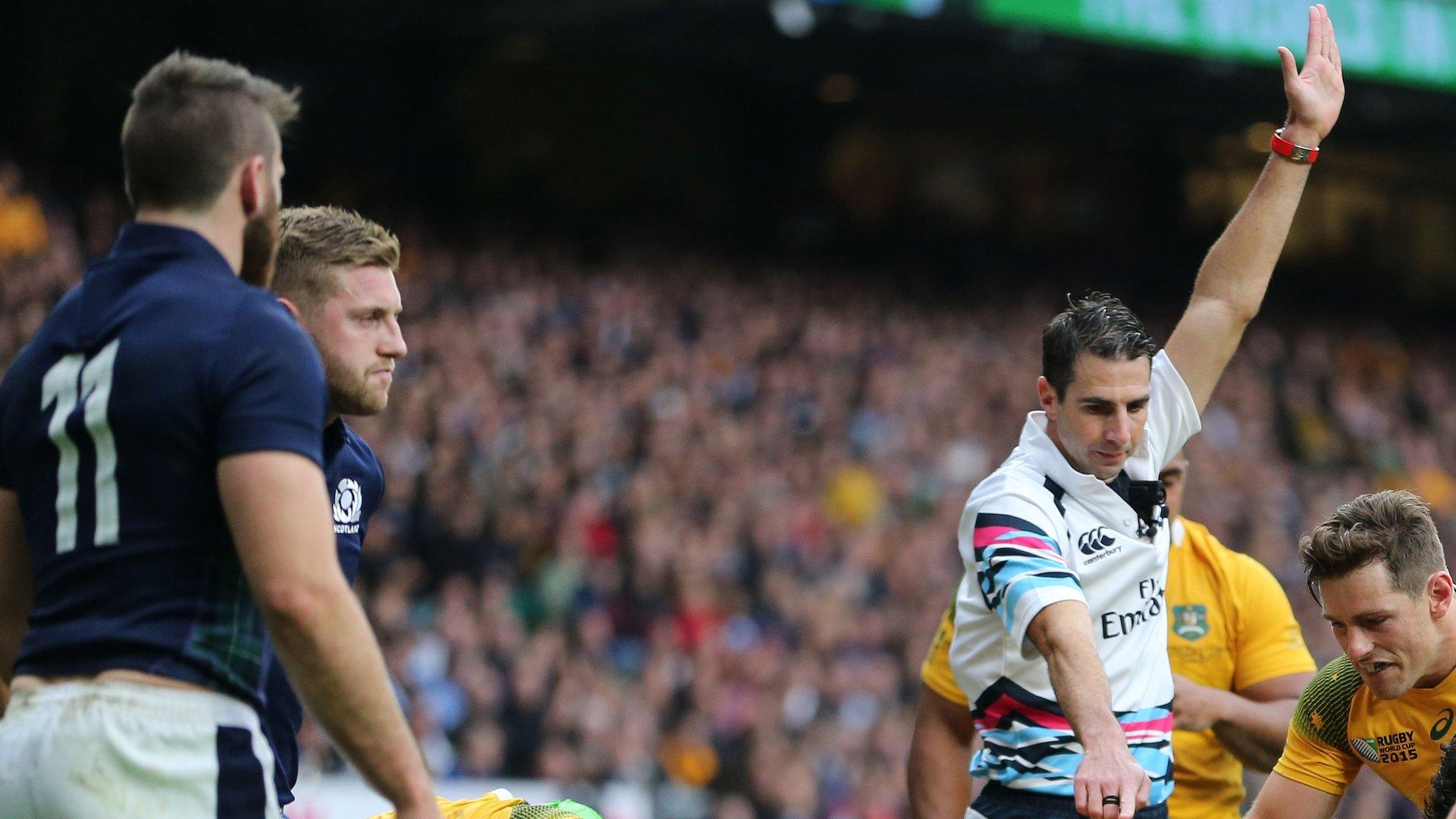
- Published20 October 2015
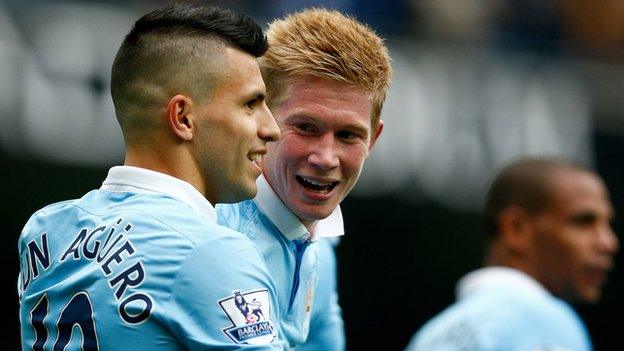
- Published19 October 2015
- Published18 September 2015
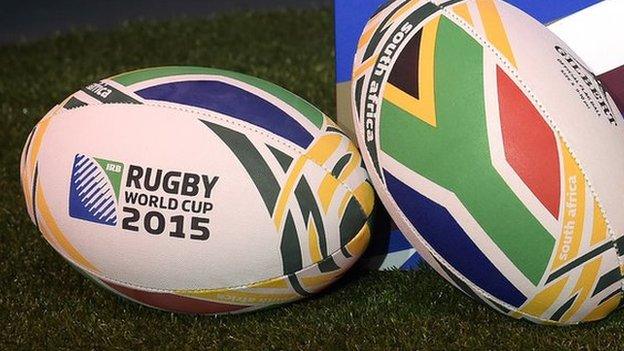
- Published3 February 2017

- Published14 September 2016

- Published15 February 2019

- Published25 September 2015
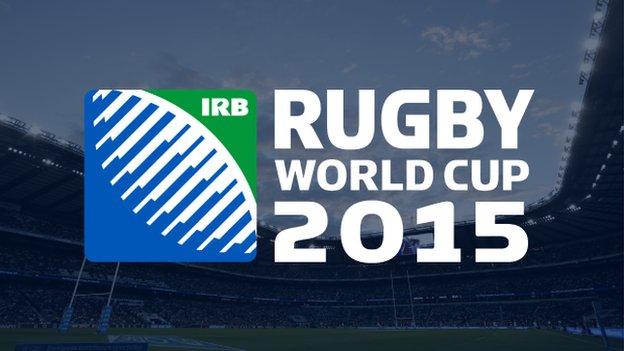
- Published8 September 2015
